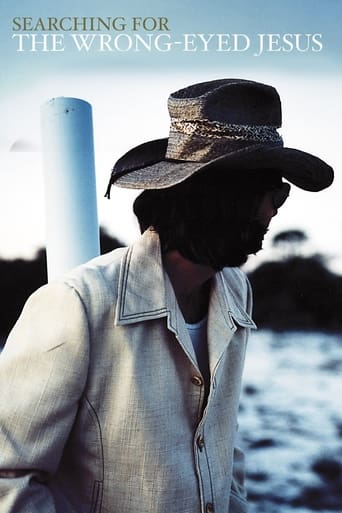imjustabill1975
As a quirky film promoting singers this movie is just fine. That's the only nice thing I can think to say about it. Otherwise it's portrayal of the South is about as accurate as The Beverly Hillbillies or The Dukes of Hazzard. I wasn't sure if I should laugh or scream at the ridiculousness of this flick. Having been born and raised in South Georgia, and having spent years in Florida and other parts of Georgia and the South, I can't help but wonder how long it took to find all these places. The movie goes from the armpit of Louisiana to one tiny town in the armpit of Florida over 600 miles away. Then, it sets off for the darkest speck in the Appalachians, another 800 miles away. All this is done in a beat-up old car, because apparently Southerners don't own anything made in the current millennium (with Jesus hanging out of the trunk). I'm not saying they should have set up a musician on an Atlanta skyscraper, or even in the middle of a college football field (although that's the real church of the South). I just don't think that the movie should position itself as a general look at the South, its music and its religion. Jim himself lives in Athens, GA. This is the land of REM and the University of Georgia. As a recent resident of a town only 30 minutes from Athens, I can assure you that snake-handling religious freaks and Jesus Saves Catfish Truck Stops are just as laughable here as they are in NYC or the UK. And no these are not the people electing our politicians (well, maybe that place in Florida). To say they are the margins of the South is putting it mildly. These places made for some great gritty backdrops to play some music in front of, but that's about it. This all might have been more believable if the stories told didn't sound so obviously scripted. I'm thinking the location scout for this film is the same guy that finds people to interview right after a tornado in the Mid-West. Quite a knack for finding the freaks. I've also lived in Cali and NYC. I find it hilarious that people from these places took this movie so seriously. Try getting out of your bubble. The South is actually a really nice place. You should see it sometime. We've learned to read and write and think for ourselves. We hardly even eat dirt or opossum anymore. Jackasses.
bitemeloser145
I grew up in the Ozarks, a member of a hillbilly clan buried deep in the hills, and this movie met me homesick. It's a wonderful portrayal of Cracker culture--the pain, the joys, the violence, the lyricism, the misery, the beauty of poor white Southern life. It's a way of life that is largely unknown except through gross caricature. This stunning documentary manages to catch a glimpse at it largely without condemnation, pity, or derision. I must admit, however, it does throw in a hefty dash of Southern Gothic.As several commenters have pointed out, this is not a complete view of Southern culture, but merely one sliver. I'm not sure that the movie would make that entirely clear to outsiders. Of course the small town (white Pentecostal) South is not "the South." Nevertheless, it is a strand of Southern culture that deserves artistic scrutiny. This documentary is an excellent effort in that direction.
JustCuriosity
Searching for the Wrong-Eyed Jesus takes the outsider on a beautiful lyrical esoteric journey through a part of the South that most of us have never seen. In that sense, it is eye-opening. However, its Cinema Verite approach lacks context and leaves the outsider to understand that are being presenting with something truly central about the essence of the modern "South" when in reality they are only seeing a highly-selective isolated and fading subculture of the poor, rural, white, poorly-educated, mostly Pentecostal world of a few small Southern towns. By only presenting this small piece of the South, the director seems to reinforce, probably unintentionally, the negative stereotypes of Southerners as "hicks" that too many outsiders unfortunately already hold. As someone who has lived in more urban parts of Virginia and Texas for the last 26 years, I find this selective picture of the "South" to be very off-putting and incomplete. The outsider is not given the context to understand the true complexity of the American South. Most Southerners live in urban and suburban areas. The importance of African-Americans to southern culture is sadly not shown. Most Southerners are not Pentecostals speaking in tongues. Most Southerners are better educated and more sophisticated than those shown in this film. The South is an increasingly multi-cultural region as well. Nor does this picture provide the viewer with any sort of analysis or economic understanding of why this part of the rural South has been left behind. Rather than presenting the heart of the South as the film implicitly claims, it shows the margins of the modern South. That's fine and important, but without more context it risks doing a disservice to the world it is trying present fairly. The viewer would be better served by a fuller accounting of today's south and an explanation of why these people shown have been marginalized.
nesdon
This beautifully photographed film, a patterned and composed documentary, is a little like D'Toqueville. A couple of British filmmakers, taken with American roots music like so many of their brethren, lay out a map of the southern subconscious with the help of some singer songwriters, Pentecostals and Jesus.This is an evocative, elusive and still elucidative work that helped me understand and accept what had been the dark flip-side of my America. They lead us on a journey, wide-eyed and tinged with love, into the prisons, honky tonks and churches, where the stories this music tells are born.


